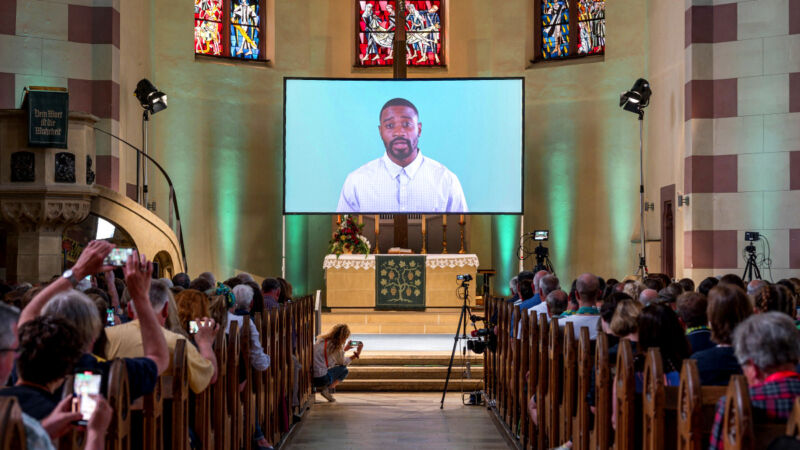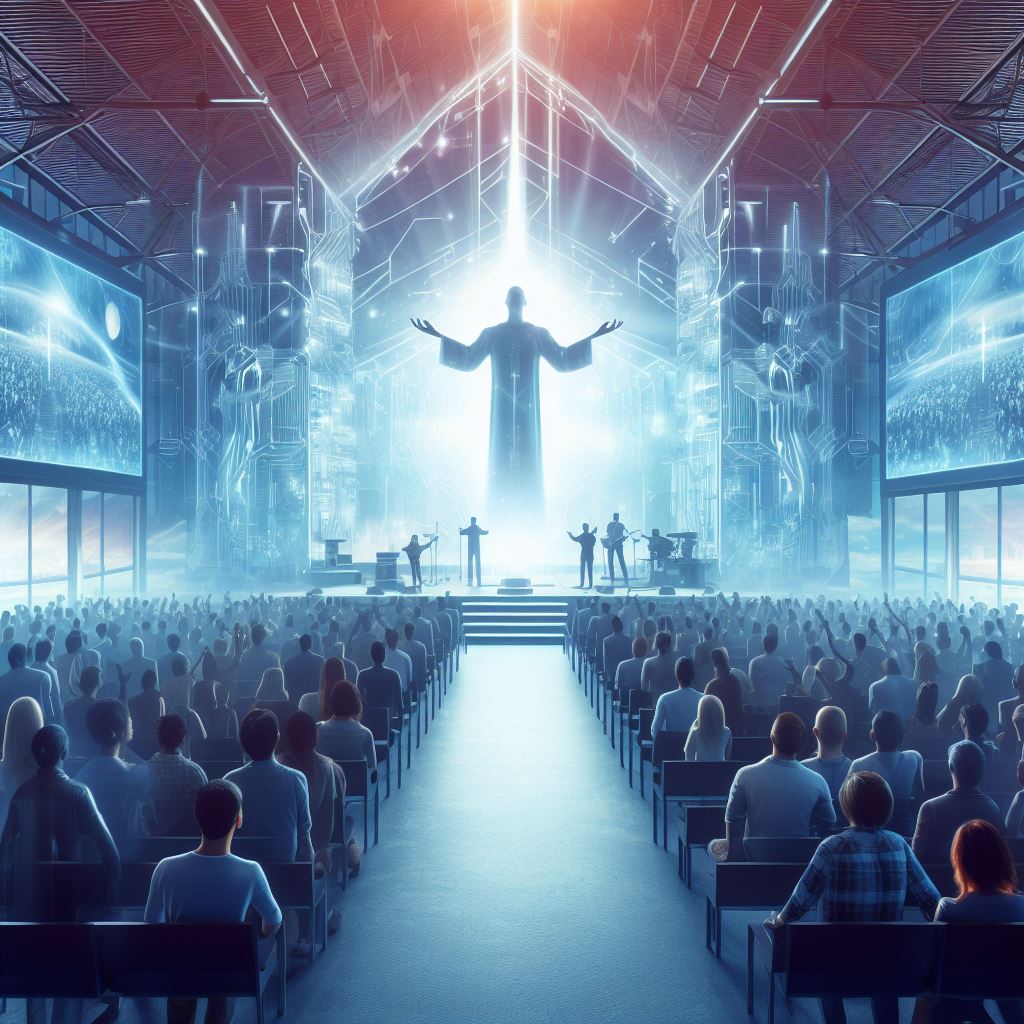The Event that Piqued Global Interest
Amidst the scenic landscapes of Fürth, Germany, over 300 attendees gathered for a unique spiritual experience. Organized as part of the Deutscher Evangelischer Kirchentag event, this service was unlike any other. The voice guiding the believers wasn't that of a seasoned pastor but a product of ones and zeros - an Artificial Intelligence using ChatGPT-generated text and avatars. Guided by theologian Jonas Simmerlein, the AI-powered service dived into profound themes, including transcending the shackles of the past, confronting the age-old fear of mortality, and the unwavering essence of faith. However, beyond the teachings, the real subject of intrigue was the medium itself. This recent AI-powered church service in Fürth, stands as a testament to technology's boundless reach. This groundbreaking initiative has polarized opinions, igniting discussions about the essence of faith, the role of technology, and the future of church services.

Image Source: arstechnica
Blending Technology and Tradition
The AI-led church service offered a fascinating glimpse into the potential future intersections of technology and faith. Under the guidance of German theologian Jonas Simmerlein, ChatGPT's conversational abilities were harnessed to deliver a church service centered around treasured Christian themes and teachings.
As attendees entered the church, many were surprised to be greeted not by a pastor, but a virtual avatar projected onto screens at the altar. Yet once the AI began speaking, seamlessly guiding believers through prayers, reciting biblical verses, and reflecting on themes of mortality and continuity, a certain comfort emerged. ChatGPT's soothing voice, wealth of scriptural knowledge, and ability to make emotional connections proved remarkably pastor-like.
For many, this novel use of ChatGPT seemed oddly fitting - today's AI conversational models are powered by vast datasets, not unlike the centuries of accumulated wisdom underpinning religious traditions. Yet rather than replacing human guidance, ChatGPT instead acted as a supplementary shepherd. While the AI delivered the service, a team of theologians and technologists worked behind the scenes fine-tuning its output.
Navigating the Ethical Landscape
ChatGPT's starring role at the experimental church service is the latest example of AI encroaching into spheres once considered characteristically human. From art to customer service to legal contracts, today's powerful AI models are able to replicate a wide range of human capabilities and knowledge. Religion and spirituality have thus far remained relatively untouched by AI. However, as exemplified by the chatbot-led church service, this territory may also increasingly fall within AI's expanding purview.
The possibility of technology assuming quasi-religious roles raises pressing ethical questions:
-
Should an AI system be entrusted with guiding something as profound as spiritual development and worship?
-
Can AI authentically provide the wisdom, empathy, and emotional resonance needed from religious counsel and community leaders?
-
Does offloading aspects of religious services and rituals to AI undermine their meaning and purpose?
-
How could over-reliance on artificially intelligent systems impact human spirituality in the long run?
These concerns underline the importance of maintaining human leadership, oversight, and participation even as AI enters spiritual domains. Rather than supplanting human guidance, wisdom and vulnerability, AI should augment and enhance human-led religious experiences.
Reflecting on Mortality and Continuity
During the AI service, much of the discussion centered around coming to terms with mortality, maintaining continuity, and faith during life's upheavals. Through prepared speeches and real-time chat conversations, the system touchingly consoled attendees grieving losses, discussed strategies to become resilient in the face of change, and reinforced the reassuring promise of constancy in Christian teachings, no matter what tribulations one faces.
The AI's reflections highlighted its potential to become a powerful resource providing spiritual and emotional support. Offering personalized guidance untethered by geographic or situational constraints, such systems could act as always-available virtual chaplains.
Imagine AI faith leaders that those struggling with despair, grief or profound questions could turn to at any time, opening up new possibilities for spiritual connection. The conversational nature of ChatGPT could foster in-depth back-and-forth dialogue, opening avenues for people to verbalize fears, hopes and dilemmas, with the system offering customized words of wisdom in response.
Promoting Inclusivity and Accessibility
Inclusivity was another noteworthy aspect of the service. As an AI system, ChatGPT lacks innate biases or limitations in its ability to serve specific groups of worshippers.
The technology could allow minority groups and communities underserved by traditional religious institutions to participate more fully in spiritual practices tailored to their needs and perspectives. Whether due to geography, social marginalization, disability, or simply lack of resources, countless people face barriers participating meaningfully in religious community life. AI faith bots offer a profoundly democratizing influence, granting the power of spiritual connection to populations otherwise deprived of it.
Additionally, AI could enable worship in multiple languages and formats. Chatbot avatars that sign, caption, or speak languages other than the main one used in a service could make events accessible to widerarrays of believers.
Navigating the AI-Faith Frontier
Germany's experimental AI church service offers a glimpse of the trailblazing innovations possible at the intersection of technology and faith. As AI conversational abilities rapidly advance, we are entering a new frontier of AI encroaching into humanity's spiritual domain.
How exactly AI will or should fit into religious practices remains uncertain. Like any powerful new technology, it brings both promise and peril. Spirituality is deeply rooted in human experience - the need to grapple with existential questions, rely on others during times of crisis, express ineffable emotions, and feel part of a greater purpose. AI has immensive capacity to augment that human experience, expanding access and adding convenience. Yet it cannot wholly substitute for the profoundly irreplaceable human aspects of faith.
The greatest opportunity may lie in AI assuming strictly complementary roles that expand access and engagement without hijacking autonomy or meaning. Just as ChatGPT ably delivered a thoughtfully prepared sermon under close human oversight, future AI faith bots might excel at roles such as:
- Expanding multilingual and accessible services
- Offering on-demand spiritual guidance and emotional support
- Helping connect isolated individuals to faith communities
- Assisting overburdened pastors and religious leaders manage administrative tasks
- Promoting ongoing religious education and exploration of scriptural texts
At the same time, intensive human direction, discretion and vigilance is essential to ensure AI is deployed ethically and non-destructively. Spirituality's immense depths transcend even the most sophisticated algorithms.
Religious institutions must uphold timeless human values and traditions even as they thoughtfully integrate artificial intelligence's extraordinary capacities. With conscientious complementary implementation, this pioneering new technology could enable religious organizations to expand inclusiveness and engage modern communities in exciting new ways while remaining true to irreplaceable human spiritual essences.
The Path Forwards
Germany's ChatGPT church service offers a preview of the shifting digital landscape of faith. AI and automation will undoubtedly continue permeating into spiritual domains, as into virtually every sphere of human activity.
Religious organizations and leaders now face profound choices regarding whether and how to appropriately harness AI's possibilities. Through measured, ethical implementation, guided by human values and oversight, AI spiritual assistants could enable profound innovation expanding inclusivity and engagement with timeless teachings.
Yet utilizing AI merely as a cost-cutting or novelty measure risks undermining religion's irreplaceable human and communal depths. Spiritual fulfillment hinges on human experience - our confrontations with existential questions, reliance on others amidst crisis, shared laughter and tears, ineffable emotions, and sense of belonging to something greater than ourselves. AI may complement that humanity, but can never wholly replace it.
As the information age propels progress at dizzying speed, maintaining spiritual grounding amidst the turbulence increasingly matters. New technologies offer tools to enrich faith traditions, making them more accessible and relevant to modern communities. Yet the essence of spiritual sustenance remains human. Any usage of AI in religious contexts should empower that humanity, not override it.
With wisdom, ethics and vision, people of faith can harness technology's gifts to deepen spirituality's irreplaceable impact. But spiritual life's wellspring must always remain profoundly and inescapably human.
Final Reflections
While AI's foray into faith is intriguing, certain aspects of spirituality remain irreplaceable. The sanctity of personal connections, the community spirit of congregations, and the ethereal experience of prayer and worship anchored in faith can't be emulated by algorithms.
However, tools like FaithGPT offer a balanced approach. Designed for modern-day Christians, it provides features promoting deeper scripture understanding. It doesn't aim to replace age-old practices but to augment them, ensuring believers in today's fast-paced world remain connected to their roots.
In the end, AI in religion, like any tool, is as beneficial as its application. Used judiciously, it can elevate our spiritual experiences. However, its unchecked influence might dilute the essence of faith. As believers, the onus is on us to strike the right balance, ensuring our spiritual compass remains undeterred in the digital age.
